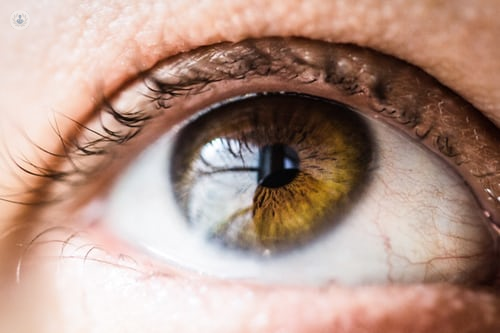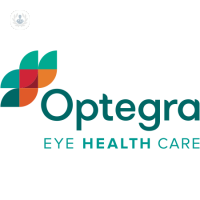What is emergency eye care?
Emergency eye care is 24-hour access for individuals who have sustained trauma to the eye or who have severe eye pain, sudden loss of vision and other eye-related injuries. The goal is to obtain immediate treatment.

What counts as an eye emergency?
The following are considered an emergency:
- Retinal detachment - where the retina peels away from the supporting tissues, which may cause permanent vision loss.
- Corneal abrasions - an eye injury where a scratch occurs on the cornea. It can cause pain, blurring and vision loss.
- Orbital bone fractures - the eye socket (orbit) protects the eye, however, with sudden force from a fall, car accident or sports injury, it might result in a fracture, which can lead to vision loss or double vision.
- Eyelid lacerations - special surgery may be needed to treat the cut, depending on the depth of the injury.
- Foreign objects in the eye - in some cases, an object embedded in the eye may cause nerve damage or vision loss.
- Traumatic iritis - a type of uveitis as a result of inflammation of the iris, which can be caused a blunt trauma, such as being poked in the eye.
- Chemicals in the eye - chemicals on the eye can cause irreversible vision loss.
What are the symptoms of an eye emergency?
Depending on the individual cause or circumstance, the following are often signs that you might need emergency eye care:
- Vision loss
- Blurred vision
- Loss of peripheral vision
- Bleeding
- Red, painful, swollen eyes
- Flashes of light, black spots or floaters.
What is the procedure at an emergency eye clinic?
If you have an eye emergency, you will not need a scheduled appointment. It is best to call ahead for further instruction on what to do, by the clinic. During the consultation, the eye specialist will:
- Medically examine and check the symptoms of your eyes
- Take your medical history
- Request an eye examination
- Recommend the best treatment that can be applied as soon as possible (which depends on your age, history, cause, doctor availability and the facilities)
After the immediate risks have been addressed, the doctor will conduct a more thorough investigation and will make an official diagnosis. Depending on the severity of the diagnosis, you may have to stay in hospital overnight, for a few days, or be discharged then and there.
What happens if my eye problem is not urgent?
Not all types of eye emergencies require urgent hospitalisation or surgery. If symptoms of an eye problem have been present for more than two weeks, you should visit your GP who will refer you to an ophthalmologist in an eye unit.
04-02-2020 04-27-2023Emergency eye care
Mr Sidath Liyanage - Ophthalmology
Created on: 04-02-2020
Updated on: 04-27-2023
Edited by: Conor Dunworth
What is emergency eye care?
Emergency eye care is 24-hour access for individuals who have sustained trauma to the eye or who have severe eye pain, sudden loss of vision and other eye-related injuries. The goal is to obtain immediate treatment.

What counts as an eye emergency?
The following are considered an emergency:
- Retinal detachment - where the retina peels away from the supporting tissues, which may cause permanent vision loss.
- Corneal abrasions - an eye injury where a scratch occurs on the cornea. It can cause pain, blurring and vision loss.
- Orbital bone fractures - the eye socket (orbit) protects the eye, however, with sudden force from a fall, car accident or sports injury, it might result in a fracture, which can lead to vision loss or double vision.
- Eyelid lacerations - special surgery may be needed to treat the cut, depending on the depth of the injury.
- Foreign objects in the eye - in some cases, an object embedded in the eye may cause nerve damage or vision loss.
- Traumatic iritis - a type of uveitis as a result of inflammation of the iris, which can be caused a blunt trauma, such as being poked in the eye.
- Chemicals in the eye - chemicals on the eye can cause irreversible vision loss.
What are the symptoms of an eye emergency?
Depending on the individual cause or circumstance, the following are often signs that you might need emergency eye care:
- Vision loss
- Blurred vision
- Loss of peripheral vision
- Bleeding
- Red, painful, swollen eyes
- Flashes of light, black spots or floaters.
What is the procedure at an emergency eye clinic?
If you have an eye emergency, you will not need a scheduled appointment. It is best to call ahead for further instruction on what to do, by the clinic. During the consultation, the eye specialist will:
- Medically examine and check the symptoms of your eyes
- Take your medical history
- Request an eye examination
- Recommend the best treatment that can be applied as soon as possible (which depends on your age, history, cause, doctor availability and the facilities)
After the immediate risks have been addressed, the doctor will conduct a more thorough investigation and will make an official diagnosis. Depending on the severity of the diagnosis, you may have to stay in hospital overnight, for a few days, or be discharged then and there.
What happens if my eye problem is not urgent?
Not all types of eye emergencies require urgent hospitalisation or surgery. If symptoms of an eye problem have been present for more than two weeks, you should visit your GP who will refer you to an ophthalmologist in an eye unit.
Experts in Emergency eye care
-
Miss Anna Bhan
OphthalmologyExpert in:
- Cataracts
- Glaucoma
- YAG laser capsulotomy
- Ocular hypertension
- iStent
- Emergency eye care
-
Miss Anna Mead
OphthalmologyExpert in:
- Cataracts
- Glaucoma
- Glaucoma surgery
- Minimally invasive glaucoma surgery (MIGS)
- Lens replacement (intraocular lenses)
- Emergency eye care
-
Mr Prateek Agarwal
OphthalmologyExpert in:
- Cataract surgery
- LASIK
- Keratoconus
- SMILE laser eye surgery
- Cornea
- Emergency eye care
-
Mr Eduardo Normando
OphthalmologyExpert in:
- Glaucoma
- Emergency eye care
- Dry eye
- Blepharitis
- Corneal abrasion
- Uveitis
-
Ms Stacey Strong
OphthalmologyExpert in:
- Cataract surgery
- Macular degeneration (AMD)
- Retinal vein occlusion
- Emergency eye care
- Intravitreal injection
- YAG laser capsulotomy
- See all

The Chiltern Hospital - part of Circle Health Group
The Chiltern Hospital - part of Circle Health Group
London Rd, Great Missenden HP16 0EN
No existe teléfono en el centro.
By using the telephone number provided by TOP DOCTORS, you automatically agree to let us use your phone number for statistical and commercial purposes. For further information, read our Privacy Policy
Top Doctors

The Clementine Churchill Hospital - part of Circle Health Group
The Clementine Churchill Hospital - part of Circle Health Group
Sudbury Hill, Harrow HA1 3RX
No existe teléfono en el centro.
By using the telephone number provided by TOP DOCTORS, you automatically agree to let us use your phone number for statistical and commercial purposes. For further information, read our Privacy Policy
Top Doctors

Optegra Manchester Eye Hospital
Optegra Manchester Eye Hospital
Optegra Eye Hospital, Manchester One Didsbury Point, 2 The Avenue, Didsbury, Manchester
No existe teléfono en el centro.
By using the telephone number provided by TOP DOCTORS, you automatically agree to let us use your phone number for statistical and commercial purposes. For further information, read our Privacy Policy
Top Doctors
-
The Chiltern Hospital - part of Circle Health Group
London Rd, Great Missenden HP16 0EN, Great MissendenExpert in:
- Allergies Ophthalmological
- Clinical analysis
- Cancer
- Breast Cancer
- Skin Cancer
- Prostate Cancer
-
The Clementine Churchill Hospital - part of Circle Health Group
Sudbury Hill, Harrow HA1 3RX, West LondonExpert in:
- Abdominal ultrasound
- Abdominoplasty
- Acne
- Allergies bronchopulmonary
- Allergies nose and ears
- Allergy Dermatitis
-
Optegra Manchester Eye Hospital
Optegra Eye Hospital, Manchester One Didsbury Point, 2 The Avenue, Didsbury, Manchester , ManchesterExpert in:
- Cataracts
- Eyelid surgery
- Laser eye surgery
- ICL lens implants
- Corneal transplant
- See all
- Most viewed diseases, medical tests, and treatments
- Visual impairment
- Diabetic retinopathy
- Retina
- Presbyopia
- Nystagmus
- Myopia
- Hyperopia (farsightedness)
- Eye examination
- Blepharitis
- Astigmatism








